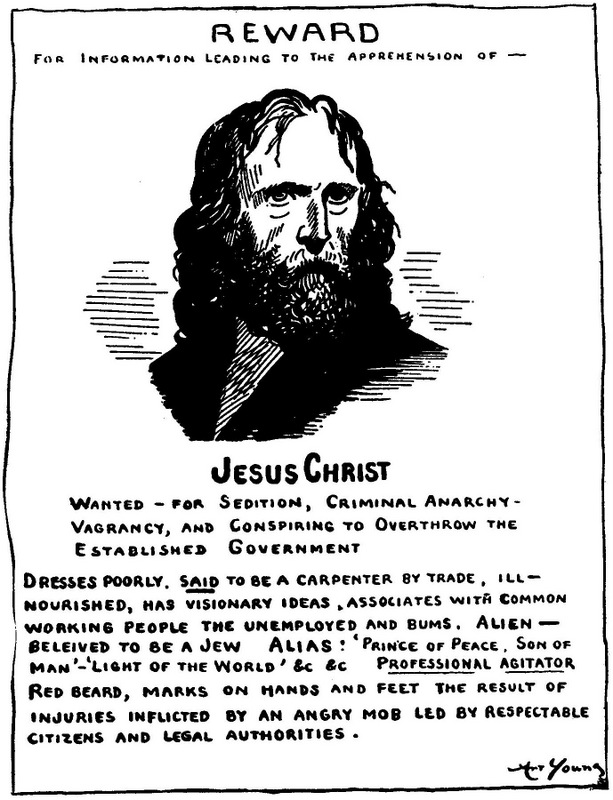
Jesus Wanted poster
Art Young, 1917
My dear friends,
In the pursuit of spiritual enlightenment and inner peace, it is paramount that we cultivate the virtues of compassion, humility, and selflessness. These are not merely doctrines of faith but the very foundation upon which harmony—both internal and external—can be established. Today, we reflect upon the words of the Apostle Paul to the church in Philippi, and the teachings of Geshe Langri Tangpa (1054–1123) in the Tibetan Buddhist lojong (mind training) tradition, to draw parallels, uniting us in the universal journey towards true contentment and understanding.
any consolation from love,
any sharing in the Spirit,
any compassion and sympathy,
make my joy complete:
be of the same mind,
having the same love,
being in full accord
and of one mind.
- Philippians 2:1-2
for the benefit of all sentient beings,
who are more precious than wish-fulfilling gems,
I will constantly practice holding them dear.
- Geshe Langri Tangpa,
"Eight Verses of Mind Transformation", verse 1
Let each of you look not to your own interests, but to the interests of others.
- Philippians 2:3-4
and from the very depths of my heart, I will recognize others as supreme.
- Geshe Langri Tangpa, "Eight Verses of Mind Transformation", verse 2
The sentiments conveyed here transcend religious boundaries, embodying a universal principle intrinsic to the human spirit. Both Christianity and Buddhism advocate for humility and selflessness, for it is in prioritizing others that we discover our true selves. It is a call to dissolve the barriers of ego, to transcend selfish desires, and to embark upon a journey that elevates compassion and altruism as the guiding lights of our existence.
who, though he was in the form of God, did not regard equality with God as something to be exploited,
but emptied himself, taking the form of a slave, being born in human likeness.
And being found in human form, he humbled himself and became obedient
to the point of death-- even death on a cross.
Therefore God also highly exalted him and gave him the name that is above every name,
so that at the name of Jesus every knee should bend, in heaven and on earth and under the earth,
and every tongue should confess that Jesus Christ is Lord, to the glory of God the Father.
- Philippians 2:5-11
I will keep these practices undefiled by the stains of the eight worldly concerns,
and, free from clinging, I will liberate all beings from bondage
to the unsubdued mind and its karma.
- Geshe Langri Tangpa, "Eight Verses of Mind Transformation", verse 8
Here lies a powerful convergence of thought - the idea of self-emptying and the transcendence over worldly desires and illusions. In Christianity, Christ is exemplified for his sacrifice, his willingness to embrace humility for the greater good. Buddhism, too, elevates the ideal of liberation from the bonds of worldly illusions. Both paths underscore the transformative power of selflessness, a stepping stone towards ultimate truth and enlightenment.
but much more now in my absence, work out your own salvation with fear and trembling;
for it is God who is at work in you, enabling you both to will and to work for his good pleasure.
- Philippians 2:12-13
and the moment a delusion arises,
endangering myself and others,
I will firmly confront and avert it.
- Geshe Langri Tangpa, "Eight Verses of Mind Transformation", verse 3
In these passages, the spiritual journey is personalized and internalized. In the teachings of both Paul and Langri Tangpa, there is an emphasis on inner transformation. It is not merely about outward actions but an intrinsic change, a metamorphosis of the soul where the divine and the innate wisdom within becomes the catalyst for transformation. It is a journey of inner scrutiny, discipline, and self-realization, steering us towards our highest potential.
In essence, these teachings, though sprouting from different spiritual traditions, converge on the foundational principles of love, compassion, and selflessness. These are not distinct paths but intertwined journeys leading us to the universal truths that transcend religious and cultural boundaries. In embracing these principles, we forge a path of harmony, peace, and enlightenment, illuminating not just our own lives but radiating this profound light to all beings.
Both texts express a profound truth: the interconnectedness of all beings. In his letter to the Philippians, Paul speaks to the community of believers, urging unity, love, and compassion. Similarly, Langri Tangpa reminds us of the value of every sentient being. The path to enlightenment is paved with selflessness and a steadfast commitment to the welfare of others. The focus shifts from the ‘I’ to the ‘we’, echoing the universal truth of our interdependent nature.